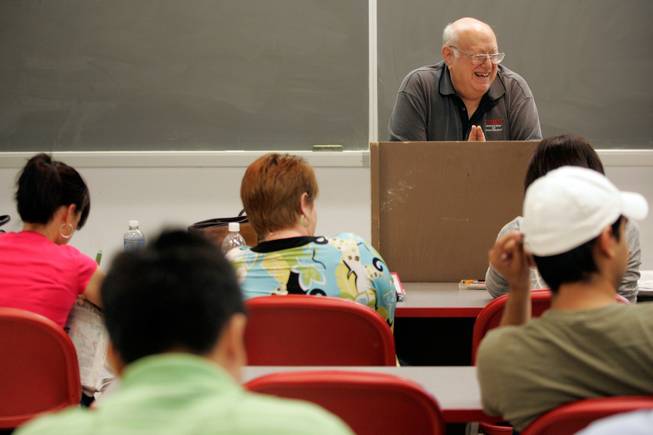
Professor Jeffrey Moskow says many students in his Current Business Topics class at UNLV aren’t as interested in the financial system’s troubles as they should be.
Friday, Oct. 3, 2008 | 2 a.m.
Beyond the Sun
Last week, about the time Wall Street was teetering on the brink of collapse, a young woman sat in the back of a current events class at UNLV, spending most of the 50 minutes on her cell phone, e-mailing or text messaging.
Two seats away, a young man was coloring in the vowels in the headlines on a copy of The Wall Street Journal.
Up front, instructor Jeffrey Moskow was trying to engage his students, mostly seniors in the college of business, in a conversation about the historic economic crisis unfolding in front of them. It’s a topic Moskow believes should matter to every young person, the nation’s financial future.
He acknowledges, however, that many of them are “still pretty much detached,” that they don’t understand how turmoil in financial markets affects them.
While the crisis is forcing Ivy Leaguers to surrender their Wall Street dreams, the 500 or so finance students at UNLV have been spared much of that pain. Top investment banks do not recruit heavily at the school, whose business college graduates tend to stay in or around Nevada, said Eileen McGarry, executive director of career services.
And most students are years away from retirement. They worry about passing classes, not about tumbling stock prices and imploding 401(k) accounts.
“You go to college for four years and you finally get the piece of paper and you have your whole life planned out,” Moskow said in an interview after class. “You’re going to get a job. ‘I’m going to get promoted, I’m going to travel.’ ”
But given the economic climate, “the reality isn’t going to meet expectations,” he said. “They may take a job that’s less than they wanted ... They may not get the field they want.”
The Wall Street Journal is the only required text in Moskow’s course, Current Business Topics.
When he started teaching the class five years ago, UNLV graduates were getting signing bonuses to take jobs at technology firms. In the real estate and finance industries, the mood bordered on euphoric. Now, all that has changed.
Unemployment has been rising. Home prices continue to fall. Big-name financial institutions have collapsed or been sold in rapid succession.
In past years, Moskow said, “the way (my) class would work is I’d come in and the students would bring up the articles that they found most interesting.
“Now there’s just such blaring headlines, we’ll end up spending 50, 60 percent of the class on one or two things, some bailout or some big company going under.”
The changes have other teachers scrambling to incorporate new information in lectures.
Economics professor Bernard Malamud opened a money and banking class last week with an alarming Wall Street rhyme titled “The Week in Review” that included the following lines:
Lehman failed
Merrill saled
AIG bailed
As Moskow said, “Things are changing so fast that the only way to be up to date is by reading newspapers or magazines or watching CNBC.”
He hopes that by keeping up with current events, students will learn to better manage their money. Last semester, his class discussed how many Americans were borrowing and spending beyond their means, purchasing homes they couldn’t afford.
“We were talking about how this thing was out of control,” Moskow said.
This semester, a frequent topic of conversation is what good investments might still be out there despite the turmoil on Wall Street.
“The economy is going down the tubes. What stuff is likely to go down fast? Which is going to hold up well?” Moskow said.
One young man suggested investing in foreign currency, betting the value of the dollar would drop. Moskow talked about how cereal companies are doing well.
He knows his message won’t get through to every student. But those paying attention can pick up useful information.
That young man doodling on his copy of The Wall Street Journal was actually listening closely to what Moskow was saying. He is Scott Hoffman, 22, a finance student and newshound who contributes frequently to class discussions.
“This is real-life stuff, and it’s really affecting you,” he said of the material Moskow covers.
Hoffman once wanted to earn an MBA and work on Wall Street, but he’s reevaluating his aspirations in light of the economic crisis. Though he’s not ruling the Wall Street option out, he said, “I’m kind of a little scared of going that route now.”
He’s thinking instead about jobs he considers more stable, such as risk management positions in the energy industry.
Still, “I don’t think most of the students appreciate it as much as I do,” Hoffman said. “I feel like more students should be more interested in what’s going on in our economy, because it’s affecting us one way or another.”

Join the Discussion:
Check this out for a full explanation of our conversion to the LiveFyre commenting system and instructions on how to sign up for an account.
Full comments policy